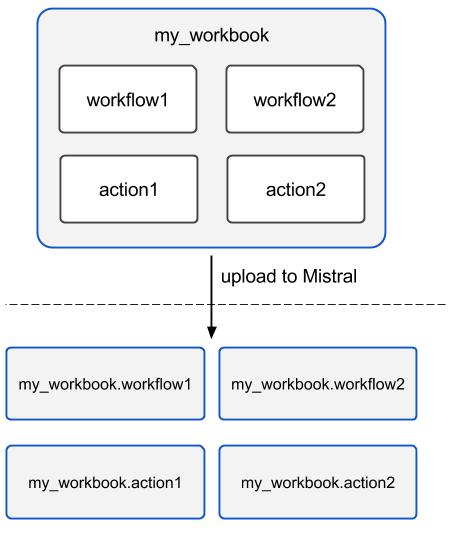Workbooks¶
Using workbooks users can combine multiple entities of any type (workflows and actions) into one document and upload to Mistral service. When uploading a workbook, Mistral will parse it and save its workflows and actions as independent objects which will be accessible via their own API endpoints (/workflows and /actions). Once it’s done the workbook comes out of the game. User can just start workflows and use references to workflows/actions as if they were uploaded without workbook in the first place. However, if need to modify these individual objects user can modify the same workbook definition and re-upload it to Mistral (or, of course, user can do it independently).
Namespacing
One thing that’s worth noting is that when using a workbook Mistral uses its name as a prefix for generating final names of workflows and actions included into the workbook. To illustrate this principle let’s take a look at the figure below:

So after a workbook has been uploaded its workflows and actions become independent objects but with slightly different names.
YAML example¶
---
version: '2.0'
name: my_workbook
description: My set of workflows and ad-hoc actions
workflows:
local_workflow1:
type: direct
tasks:
task1:
action: local_action str1='Hi' str2=' Mistral!'
on-complete:
- task2
task2:
action: global_action
...
local_workflow2:
type: reverse
tasks:
task1:
workflow: local_workflow1
task2:
workflow: global_workflow param1='val1' param2='val2'
requires: [task1]
...
actions:
local_action:
input:
- str1
- str2
base: std.echo output="<% $.str1 %><% $.str2 %>"
NOTE: Even though names of objects inside workbooks change upon uploading Mistral allows referencing between those objects using local names declared in the original workbook.
Attributes
- name - Workbook name. Required.
- description - Workbook description. Optional.
- tags - String with arbitrary comma-separated values. Optional.
- workflows - Dictionary containing workflow definitions. Optional.
- actions - Dictionary containing ad-hoc action definitions. Optional.
For more details about Mistral Workflow Language itself, please see Mistral Workflow Language specification

Except where otherwise noted, this document is licensed under Creative Commons Attribution 3.0 License. See all OpenStack Legal Documents.